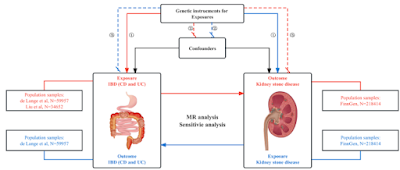Inflammatory bowel disease (IBD) and kidney stones are two seemingly unrelated medical conditions. However, emerging research points to a significant connection between the two. Understanding this connection can help those with IBD manage their health more effectively and reduce their risk of kidney stones.
Understanding Inflammatory Bowel Disease (IBD)
Types of IBD
Crohn's disease and ulcerative colitis are the two main types of IBD. Both conditions cause chronic inflammation of the gastrointestinal tract, but affect different areas and layers of the intestine.
Symptoms and diagnosis
Common symptoms include abdominal pain, diarrhea, weight loss, and fatigue. Diagnosis usually involves a combination of blood tests, stool tests, endoscopy, and imaging studies.
Causes and risk factors
The exact cause of IBD is unknown, but it is thought to involve a combination of genetic, environmental, and immune system factors.
Overview of kidney stone disease
What are kidney stones?
Kidney stones are hard deposits of minerals and salts that form inside your kidneys. They can affect any part of the urinary tract.
Types of kidney stones
There are several types of kidney stones, including calcium stones, uric acid stones, struvite stones, and cystine stones.
Symptoms and diagnosis
Symptoms include severe pain, usually on the side of the abdomen, nausea, vomiting and blood in the urine. The diagnosis is usually confirmed using imaging tests such as a CT scan or ultrasound.
Causes and risk factors
Factors that increase the risk of kidney stones include dehydration, certain diets, obesity, and certain medical conditions such as hyperparathyroidism.
The link between IBD and kidney stones
How IBD affects kidney function
IBD can directly and indirectly affect kidney function. Chronic inflammation and metabolic changes in patients with IBD may increase the risk of kidney stones.
Metabolic changes in patients with IBD
IBD often leads to metabolic imbalances, such as altered calcium, oxalate, and uric acid metabolism, which can contribute to stone formation.
Increased risk factors for kidney stones in patients with IBD
Patients with IBD have an increased risk of developing kidney stones due to factors such as chronic dehydration, altered gut microflora, and the use of certain medications.
Mechanisms of kidney stone formation in patients with IBD
Dehydration and decreased urine output
Chronic diarrhea, a common symptom of IBD, can lead to dehydration, which reduces urine output and increases the concentration of stone-forming substances in the urine.
Changes in urine composition
IBD can cause changes in the composition of urine, such as increased oxalate levels, which can promote stone formation.
Effect of drugs used in the treatment of IBD
Medications such as corticosteroids and immunosuppressants commonly used to treat IBD can also affect kidney function and increase the risk of stones.
Effect of IBD treatment on kidney stone risk
corticosteroids
These drugs can cause increased urinary calcium excretion, which is a risk factor for kidney stones.
Immunosuppressants
Some immunosuppressants can affect kidney function and contribute to stone formation.
Biological therapies
While biologics are effective in treating IBD, their effect on the risk of kidney stones is still being studied.
Dietary factors in IBD and kidney stones
Dietary restrictions in IBD
Many IBD patients follow a restricted diet to manage their symptoms, which can sometimes lead to nutritional deficiencies that increase the risk of kidney stones.
Nutritional deficiencies
Lack of calcium, magnesium and other nutrients can contribute to the development of kidney stones.
Dietary recommendations for the prevention of kidney stones
To prevent kidney stones, IBD patients should focus on staying hydrated, maintaining a balanced diet, and possibly incorporating supplements as recommended by their healthcare provider.
Strategies to prevent kidney stones in patients with IBD
The importance of hydration
Staying well hydrated is essential for preventing kidney stones, especially in IBD patients who are prone to dehydration.
Diet adjustments
Avoiding foods high in oxalates, reducing salt intake and ensuring adequate calcium intake can help reduce the risk of stones.
Regular checks and inspections
Regular medical check-ups and monitoring of kidney function can help detect any early symptoms of kidney stones and manage them quickly.
Treatment of kidney stones in patients with IBD
Treatment options for kidney stones
Treatment options include medication, lifestyle changes and, in severe cases, surgery to remove the stones.
Adjusting IBD treatment to minimize risk
Doctors may need to adjust IBD treatment plans to minimize the risk of kidney stones and balance effective IBD treatment with stone prevention.
Long-term management strategies
Long-term treatment includes ongoing monitoring, diet modification and possibly medication to prevent stone recurrence.
Conclusion
In conclusion, there is a significant link between inflammatory bowel disease and the risk of kidney stones. Understanding this connection is key to effective management and prevention. By staying hydrated, following dietary recommendations, and regularly monitoring your health, IBD patients can reduce their risk of kidney stones and maintain better overall health.
Frequently asked questions
Can IBD directly cause kidney stones?
No, IBD itself does not directly cause kidney stones, but increases the risk through metabolic changes and other factors.
What are the early symptoms of kidney stones in IBD patients?
Early symptoms include severe abdominal or back pain, blood in the urine, and frequent painful urination.
How can diet help treat IBD and kidney stones?
A balanced diet that avoids foods high in oxalates and includes adequate hydration can help manage both conditions.
Are there specific tests to monitor the risk of kidney stones in IBD patients?
Yes, regular urine tests and imaging studies can help monitor the risk of kidney stones in IBD patients.
What should I do if I have both IBD and kidney stones?
Consult with your healthcare provider to develop a comprehensive management plan that addresses both conditions.




.jpg)
.jpg)






0 Comments